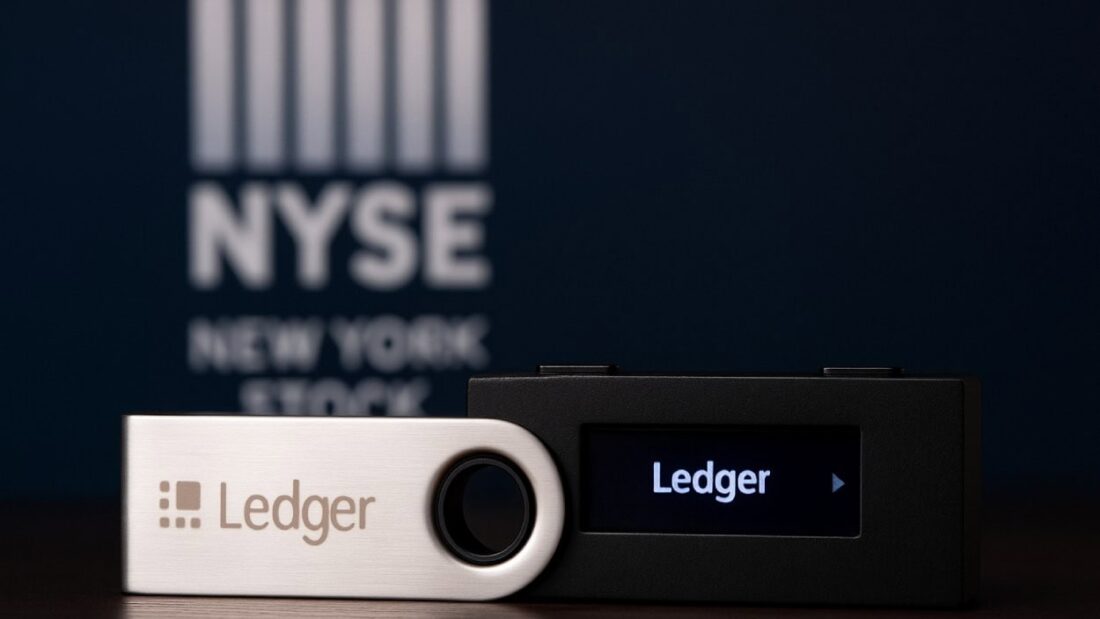Ledger, a Paris-based crypto security firm, is planning a New York stock market debut as rising cyber threats fuel unprecedented demand for its hardware wallets.
Key Takeaways
- Ledger is considering a US IPO or private funding round in 2026 following its strongest revenue year since launch.
- Record crypto thefts in 2025, totaling $2.2 billion, have significantly increased demand for secure offline storage.
- Ledger now safeguards around $100 billion in Bitcoin assets, positioning it as a market leader in cold wallet solutions.
- A recent update to Ledger’s multisig wallet app sparked criticism over its new fee structure and centralization concerns.
What Happened?
Ledger is exploring a public listing on the New York Stock Exchange in 2026, fueled by record growth in 2025 and increasing interest in cold storage solutions. The move comes amid a sharp rise in cyberattacks targeting crypto users, pushing both individuals and institutions toward more secure storage options.
SELF-CUSTODY IS QUIETLY WINNING
— CryptosRus (@CryptosR_Us) November 10, 2025
Ledger’s revenue has climbed into the hundreds of millions this year, driven by the increase in hacks and security risks across crypto.
The company now secures an estimated $100B+ in Bitcoin for customers worldwide.
When people start moving… pic.twitter.com/bvCqYVNNRW
Record-Breaking Year Driven by Cybersecurity Fears
Ledger, founded in 2014, reported triple-digit millions in revenue this year, making 2025 its most successful period yet. The boost comes as more users turn to cold wallets to protect digital assets from hackers. CEO Pascal Gauthier confirmed the growing threat, stating:
Recent data from Chainalysis supports this trend. Hackers stole $2.2 billion worth of digital assets in the first half of 2025 alone, already exceeding the full-year total for 2024. Notably, 23% of these attacks targeted individual wallets, highlighting the vulnerability of online storage and growing trust in hardware-based security.
Ledger’s Growing Market Presence
As of 2025, Ledger secures about $100 billion in Bitcoin for its users across the globe. The firm is widely seen as the dominant force in the hardware wallet space, outpacing competitors like Trezor and Tangem.
With strong backing from investors such as 10T Holdings and True Global Ventures, and a 2023 valuation of $1.5 billion, Ledger is positioned for further growth. Gauthier also noted that New York has become the epicenter of institutional crypto funding. “Money is in New York today for crypto, it’s nowhere else in the world, it’s certainly not in Europe,” he said.
The company expects continued momentum through the holiday shopping season, with events like Black Friday and Christmas often delivering sales spikes.
Fee Controversy Over New Multisig App
While the company’s trajectory remains strong, recent product changes have sparked backlash among users. In October, Ledger launched a revamped multisignature wallet interface. Though some praised the technical improvements, many users were frustrated by the new fee structure, which includes a $10 flat fee per transaction plus a 0.05% variable transfer fee.
Critics, including developers like pcaversaccio, argue that these fees signal a shift away from Ledger’s original Cypherpunk values, creating what some described as a “centralized choke point” focused on profit rather than privacy.
This internal friction reflects the larger tension between crypto’s decentralized roots and the demands of scaling a global business, especially as Ledger prepares to go public or raise new funds.
CoinLaw’s Takeaway
In my experience, when a crypto company starts talking IPO, it’s a sign they believe they’ve earned market dominance. And Ledger has. I found the timing of their possible Wall Street listing interesting, especially with security fears at an all-time high. That $2.2 billion figure is not just a number, but it represents lost trust, lost funds, and renewed focus on security. Ledger is stepping into that space with confidence, even if some users feel they’re losing the soul of the original crypto ethos. Still, for many investors and institutions, trust and safety trump ideology. And that’s where Ledger wins.


































































